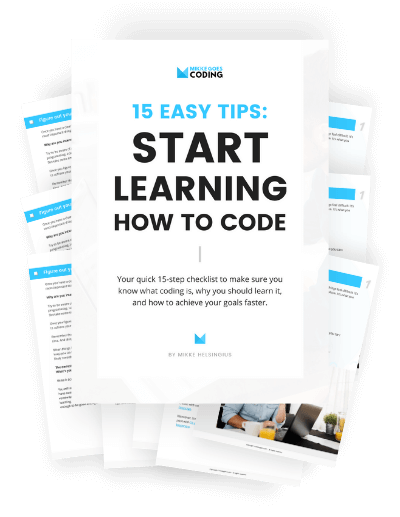What are the best sites like Codecademy in 2024?
Which website is the best Codecademy alternative for teaching yourself how to code?
If you are looking for the best online course platform to start learning tech skills at your own pace, you are in the right place.
I know how difficult it can be to find the right coding course when you are new to tech. There are dozens of popular websites similar to Codecademy, and they offer slightly different things.
If you’re not familiar, check out my complete Codecademy review.
So what’s the best place for you to start learning if you don’t want to use Codecademy for some reason?
In this post, I’ll walk you through 6 beginner-friendly and top-rated online course platforms for learning in-demand tech skills like web development, data science, mobile development, and more.
By the end of this post, you will have a better overview of which websites similar to Codecademy are right for your tech goals, where to start, and what to pay attention to.
If you feel overwhelmed by the number of learning platforms out there, I know how paralyzing it can get. If that sounds familiar at all, keep reading!
Please note: This post contains affiliate links to products I use and recommend. I may receive a small commission if you purchase through one of my links, at no additional cost to you. Thank you for your support!
What is Codecademy?
Codecademy is an online course platform for learning a variety of tech skills and programming languages.
The company was founded in 2011 and is currently based in New York City. With over 50 million students (and counting), Codecademy is one of the most popular tech skill learning platforms worldwide.

Codecademy offers a massive selection of courses ranging from programming languages like JavaScript to higher-level subjects like data science or mobile development, for example.
The current course catalog covers 15 popular markup and programming languages: HTML, CSS, Python, JavaScript, Java, SQL, Bash/Shell, Ruby, C++, R, C#, PHP, Go, Swift, and Kotlin.

How does Codecademy work? 6 key features
Each coding course platform is a bit different, and Codecademy has a few key features you should try out and get familiar with.
Here are a few helpful features and resources to support your learning on Codecademy:
- Sorting Quiz:
The free Sorting Quiz helps you determine your strengths and find the most suitable skills to learn. You will answer a few simple questions, and the results show you recommended learning paths and resources that match your goals and interests. - Learning paths:
Codecademy Pro unlocks a selection of structured skill and career paths with a curated curriculum of targeted courses and skills you need to get job-ready. This can be a huge time-saver since you can learn everything in the same place. - Quizzes:
Included in Pro, quizzes are an easy way to track your progress and test your skills. - Blog articles:
The Codecademy blog is a fantastic place to learn more about the fundamentals of programming and tech in general. - Supportive community:
You can find help, get feedback on your projects, and connect with other students on the Codecademy Forums. - Free cheatsheets:
Use the massive selection of free cheatsheets as a go-to reference for the fundamentals for any skill you are learning.

Codecademy cost and pricing
Codecademy is a subscription-based platform with two pricing options:
The Basic plan is 100% free. You can sign up within seconds, and get instant access to interactive introductory lessons.
The free beginner-level courses and tutorials are a fantastic way to get a basic understanding of how coding works. If you are new to tech, use the free tutorials to see if coding is your thing and if you enjoy learning it.
The biggest shortcoming of the Basic plan is: you will only learn the bare essentials.
The free content doesn’t offer any hands-on coding projects for you to really practice your skills.
Codecademy Pro is a paid subscription that unlocks the entire course catalog, including portfolio-ready projects.
Pro comes with two billing options:
- $39.99/month when paid monthly
- $239.88 when paid annually – that’s $19.99/month, saving you $240 compared to 12 months with the monthly billing cycle

Here are a few key benefits you’ll get with Codecademy Pro:
- The Pro plans don’t just unlock “more” content and tutorials. The true value comes from the opportunities to apply your skills to practical, real-world projects.
- Pro shows you how to build projects that you can add to your developer portfolio. You will have hands-on work samples to showcase to potential employers when you start applying for jobs.
- The curated Career Paths and Skill Paths allow you to set a clear goal and learn the necessary skills one by one to achieve it. This is a 100% hassle-free way of learning at your own pace without having to second-guess yourself.

Is Codecademy Pro worth it?
If you are new to coding, start with the free resources. Get a basic understanding of what coding is about and what you can create with it.
If you feel motivated to learn more and are willing to put in the effort to start a career in tech, consider investing in paid resources. They usually offer a better overall learning experience. You get carefully curated content, more hands-on, portfolio-ready projects, and better support.
It’s a good idea to at least try Codecademy Pro and see how you like it. You can try it for free with a 7-day trial, and then decide whether you want to upgrade.
For more details, check out my full Codecademy review.
Sites like Codecademy: The best Codecademy alternatives
Now, let’s look at a few of the best sites like Codecademy where you can learn how to code.
Perhaps you’ve tried Codecademy but you didn’t fall in love with their courses.
Or maybe you don’t like their course content and would rather learn by following video tutorials.
Luckily, you can choose between dozens of coding course platform these days.
Codecademy is a subscription-based service. Therefore, I’ll cover other sites with a similar pricing structure first.
Further below you will find even more Codecademy alternatives that offer different pricing models.
1: Pluralsight
Pluralsight is an online learning platform with thousands of interactive video courses and guides for coding and other tech skills.
Their content covers a range of popular, in-demand topics such as data science, cybersecurity, software development, and more.
Pluralsight’s courses are created by leading industry experts and partners. The entire content is produced in-house, ensuring top-notch quality and consistency across different skill paths.

Let’s look at a few key pros and cons of Pluralsight next:
Pros of Pluralsight
- Massive selection of courses: 7,000+ courses with new content added regularly
- Guided learning paths: learn any given skillset from start to finish to get job-ready faster
- The free Skill IQ helps you find the right starting level so you won’t learn stuff you already know
- Teachers are leading industry experts
- Helpful, supportive community
Cons of Pluralsight
- No lifetime access: you lose access as soon as your subscription expires
- You can’t purchase individual courses – the subscription unlocks the entire catalog
- Course pages don’t include reviews from past students
- No refunds
What can you learn on Pluralsight?
Pluralsight offers courses and resources for dozens of in-demand topics, such as:
- Data analysis and data science
- Machine learning and AI
- Software development
- IT ops
- Information and cybersecurity
- Creative skills (e.g. game development, 3D animation)
- Business skills (e.g. project management, MS Excel, business analysis)
- Manufacturing and design
Browse their full course library here to discover all the skills and paths Pluralsight offers.

Pluralsight content quality
Next, let’s see how well Pluralsight compares to Codecademy in terms of content quality.
If you are entirely new to learning tech skills, you want to use a platform that walks you through everything you need to know.
Otherwise, you’ll need to combine multiple learning resources, which usually makes it difficult to maintain a clear overview of what you need to do next
As of content quality, Pluralsight offers some of the highest-quality courses you can find.
All courses are produced in-house, meaning they follow a consistent pattern for creating a supportive learning experience.
The videos are high-quality, both in terms of image and sound.
Plus, you will learn from industry experts who truly know what they are talking about. This is a fantastic opportunity to learn from people who have tons of hands-on experience.
Pluralsight ease of use
When it comes to ease of use, Pluralsight has an intuitive interface where you can quickly find the right courses for the skills you wish to learn.
To find the best resources for a given specialization, simply head over to the course catalog and browse courses by subject.
Alternatively, if you want to learn a specific programming language or workflow tool, use the search field to find relevant courses and sort them by rating, for example:

One downside of the search feature is that you can’t filter or sort courses by popularity or number of students.
When you click on a course, the course homepage shows you key details including:
- Course description
- Course curriculum
- Rating, skill level, duration
- FAQs
- Author bio

In short: although the number of courses can feel overwhelming, it’s still quite easy to find the right course for the skill you want to learn.
The general interface is intuitive, easy to navigate, and you can quickly find top-rated courses to start your learning journey.
Quick Summary: Pluralsight vs. Codecademy
Compared to Codecademy, Pluralsight is:
- More interactive
- Better for people who learn best by following videos
- More expensive
- More difficult to navigate to find the right course for you
How to get started with Pluralsight?
You can start using Pluralsight for free with their 10-day free trial. Sign up for free here.
I recommend taking the free Skill IQ assessment to figure out what your current skill level is. If you have some experience in tech, this helps you avoid learning things you already know.
If you enjoy learning with Pluralsight, consider activating a subscription after your free trial. If you’d rather not, remember to cancel your trial before day 10 is over.
Start learning with Pluralsight here
2: Coursera Plus
Coursera Plus is a subscription-based version of the Coursera online learning platform.
The subscription gives you unlimited access to 3,000+ top-quality courses, hands-on projects, and job-ready certification programs – over 90% of the entire course catalog on Coursera.

If you are serious about learning tech skills this year and want to take multiple courses, Coursera Plus may be a more afforable option than purchasing each course individually. Thus, it’s a good idea to compare your pricing options on the platform.
Let’s take a brief look at the pros and cons of Coursera Plus:
Pros of Coursera Plus
- Massive selection: 3,000+ courses
- Super high video quality
- Courses created by top universities worldwide
- Very structured learning environment
Cons of Coursera Plus
- No lifetime access: you lose access as soon as your subscription expires
- Fixed enrollment dates
- Certifications aren’t widely recognized
- Pricing structure between Coursera vs. Coursera Plus can be confusing
What can you learn on Coursera Plus?
Coursera Plus gives you access to more than 90% of the entire Coursera catalog, including popular topics such as:
- Data science
- Computer science
- Business skills (e.g. communication, marketing, project management)
- Physical science and engineering
- Social sciences
To quickly find out if a course is included in Coursera Plus, look for “Included with Coursera Plus” under the enrollment button.
Alternatively, head over to Coursera Plus and use the search tool:

Coursera Plus content quality
Coursera offers some of the highest-quality courses available online. All instructors and authors from top-ranking universities or companies – they know what they’re talking about.
As for the individual course elements and modules, each course is divided into small, easily digestible lessons with videos, quizzes, and helpful resources.
The videos are produced in-house, so you can expect a consistent learning experience and quality.
Coursera Plus ease of use
Now, is Coursera Plus easy to use?
Although the course catalog is pretty massive, it’s easy to find the right courses and learning resources for any specialization you are interested in.
Head over to Coursera Plus and click on blue Explore button to open the full course catalog:

The Explore menu allows you to browse courses by topic and quickly find free, popular, or new courses by subject.
Here’s what you’ll see for Data Science, for example:

This same overview lets you find courses for:
- Popular skills
- Degrees
- Certificate programs
Each course has a homepage with additional details, such as:
- Course description
- Skills you will gain
- Certificate details
- Course duration
- Language and subtitle options
- Instructor details
- Reviews from past students
- FAQ

When you start a course, the learning interface is also very clear and easy to navigate. You can easily track your overall progress and see how long each lesson will take.
Quick summary: Coursera Plus vs. Codecademy
So, is Coursera Plus better than Codecademy? Let’s do a quick recap of the key differences.
Compared to Codecademy, Coursera Plus is:
- More user-friendly
- More interactive (video lessons)
- Higher quality (with renowned instructors from leading universities worldwide)
- More expensive
All in all, you really get what you pay for with Coursera Plus. It’s a tad more expensive than Codecademy, but the course quality is 100% top-notch. These are the same courses you would be taking as a student at Yale or Stanford University, for example.
How to get started with Coursera Plus?
Start by finding the right skill path in the course catalog.
Browse through the most popular courses to find the right fit for your skill level and goals.
Make sure you can dedicate time to learning in the next 7 days. Then, sign up for your free 7-day trial to create your account.
If you enjoy learning with Coursera Plus, consider activating a subscription before your trial ends.
If you don’t want to continue, remember to cancel your trial before day 7 ends.
Start learning with Coursera Plus here
3: DataCamp
DataCamp is one of the best websites similar to Codecademy when it comes to learning all about data science.
The company was established in 2013, and it now offers some of the most comprehensive and in-depth courses for learning data science.
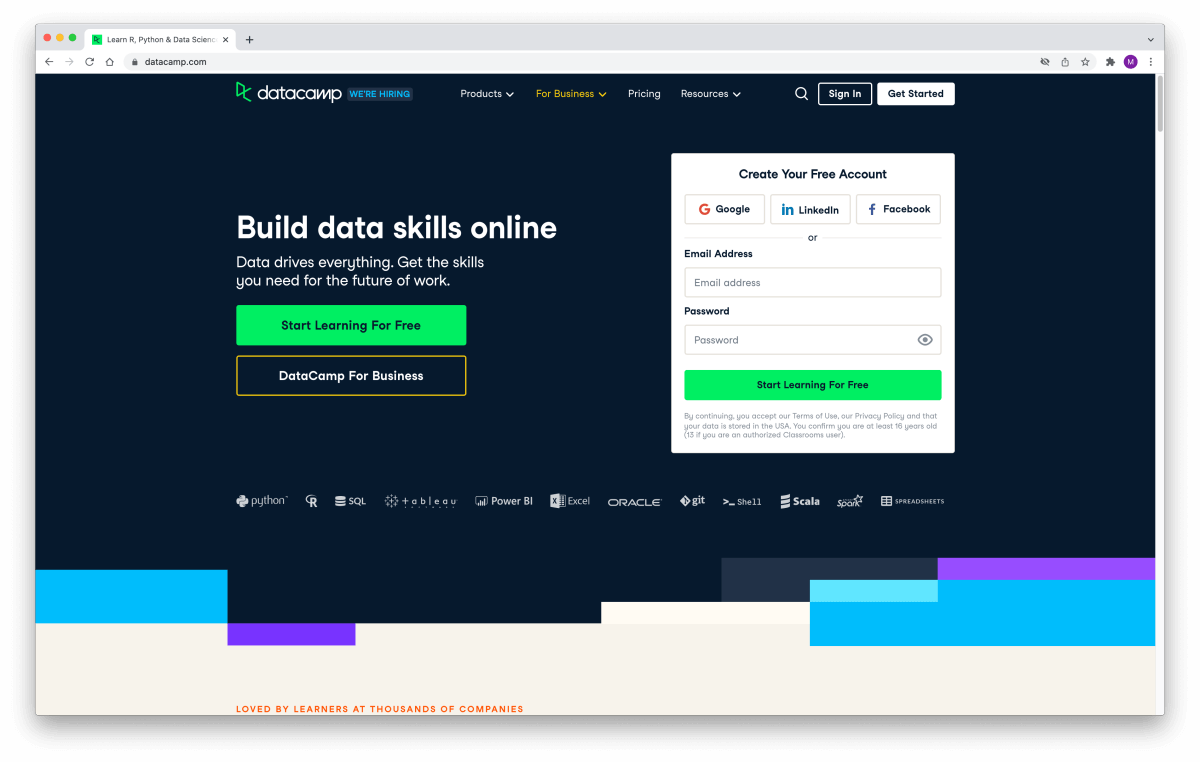
DataCamp is similar to Codecademy in that it offers both stand-alone courses as well as curated learning tracks.
Each track is a step-by-step learning program with multiple courses that support each other.
Completing a Track will earn you a Statement of Accomplishment, which isn’t officially accredited but will definitely look great on your resume.
Let’s look at a few key pros and cons of DataCamp next:
Pros of DataCamp
- Focussed 100% on data science (= unparalleled level of expertise)
- Easy to find the right courses
- Interactive and engaging courses
- Learn from industry experts
- Clear pricing structure
Cons of DataCamp
- No lifetime access: you lose access as soon as your subscription expires
- Courses only cover data science
- No formal test or assessment at the end of each course
What can you learn on DataCamp?
Compared to Codecademy, DataCamp strictly offers courses in data science and data analysis.
Their catalog covers popular tools and technologies such as:
- Python
- R
- SQL
- Git
- Shell
- Scala
- Tableau
- Excel
- etc.

Alternatively, you can browse the catalog by topic to find learning resources for:
- Data manipulation
- Data visualization
- Reporting
- Machine learning
- Probability and statistics
- Importing and cleaning data
- Applied finance
- Data engineering
- etc.

For more details, check out the full DataCamp course catalog here.
DataCamp content quality
Let me be very clear here: when you start learning with DataCamp, you will get expert guidance from instructors who really know their stuff.
Before starting a course, make sure you read the author bio to get an overview of their background and experience.
All in all, the content quality is impressive. And although you will learn from renowned experts, they always explain each topic so that everyone can follow along. Even if you are new to data science, you will never feel left behind.
DataCamp ease of use
DataCamp is super easy to use regardless of your level of experience with online courses or data science.
Because the entire platform focusses on a single topic (data science), it’s much easier to find the right courses and resources for your goals.
To get started, you simply need to choose a Skill Track or a Career Track. They all have a different series of courses you can follow and finish at your own pace:
- Skill Tracks include 3–7 courses for a guided learning experience with videos and interactive exercises.
- Career Tracks consist of 10–27 courses, teaching you a complete skillset for starting a new career as a data analyst or Python programmer, for example.

I always recommend following a full Career Track if you are new to tech and data science. They offer you an all-in-one learning path so you can rest assured knowing you’re learning everything you need to know to get job-ready.
Quick summary: DataCamp vs. Codecademy
Compared to Codecademy, DataCamp is:
- Better for learning data science (because that’s their expertise)
- More engaging thanks to video tutorials
- More affordable
How to get started with DataCamp?
Out of all the sites like Codecademy in this article, DataCamp is probably the easiest to get started with.
You can create a free account here – no credit card needed:

On the next page, choose the language you wish to learn – R, Python, or SQL:

If you’re not sure what you want to learn, just head over to the course catalog:
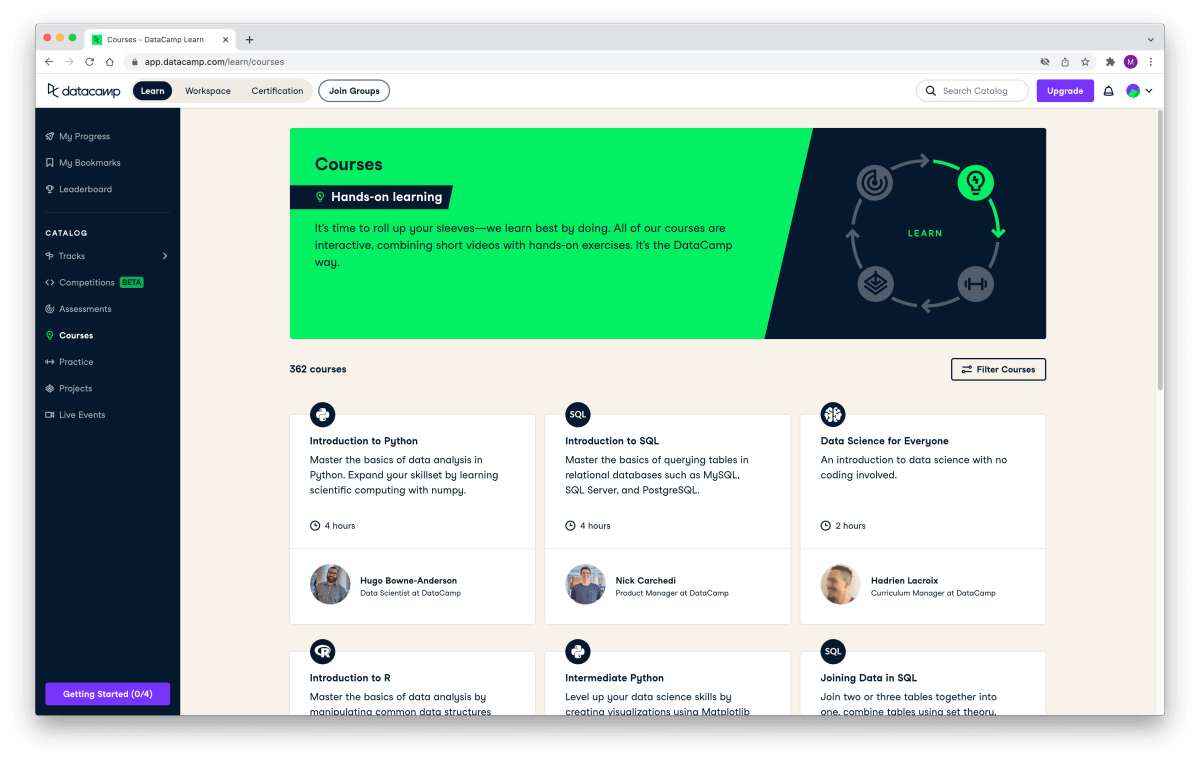
The free plan gives you instant access to the first chapter of each course, a handful of projects, and a few practice challenges.
Start by choosing your specialization or a Career Track, and go through the first chapters of the most important courses included.
If you enjoy learning with DataCamp, consider upgrading to a paid plan to unlock all 350+ courses, Career Tracks, Skill Tracks, and more.
My tip: Ask your employer if they’ll cover your subscription cost!
Start learning with DataCamp here
Further Codecademy alternatives
The above sites like Codecademy are all subscription-based.
The biggest shortcoming with subscriptions is that you will lose access to all content as soon as your subscription expires.
If you want to learn at your own pace and aren’t in a hurry, paying for a subscription may end up costing you more than purchasing individual courses where you get unlimited lifetime access – including all future updates.
There’s no right or wrong here. You simply need to be mindful of how you’ll get the biggest return on your investment.
If you’d rather use a Codecademy alternative that’s not subscription-based, here are a few of my favorites:
4: Udemy (my favorite!)
Udemy is one of the largest learning platforms worldwide, with over 180,000 courses across a variety of different topics. It’s a huge online marketplace for learning anything you can imagine.

The biggest difference between Udemy and Codecademy is: you can choose and purchase individual courses on Udemy.
And it gets even better:
When you purchase a course you get lifetime access – including all future updates.
For example, I purchased this fantastic web development course in late 2016. I managed to catch a flash sale and the course cost me about $15.
But you know what? I still watch some of the lessons regularly, even after 5 years. It’s such a great go-to reference for those days when my head feels like a sieve and I need to double-check something.
Getting lifetime access to your coding courses is so helpful when you are new to tech. On Udemy, you can watch and re-watch any lesson at any time, for as long as you need to.
If you aren’t familiar with the platform yet, learn more in my full Udemy review.
Udemy vs. Codecademy:
Compared to Codecademy, Udemy is:
- More affordable – instead of paying a monthly subscription fee, you can purchase an individual course during a Udemy flash sale for $10–15.
- More flexible – once you buy a course, you have lifetime access.
- Offering a larger pool of courses
My tip: Because anyone can create and sell a course on Udemy, the quality can vary a lot. Make sure to check the ratings and reviews from past students before purchasing a course.
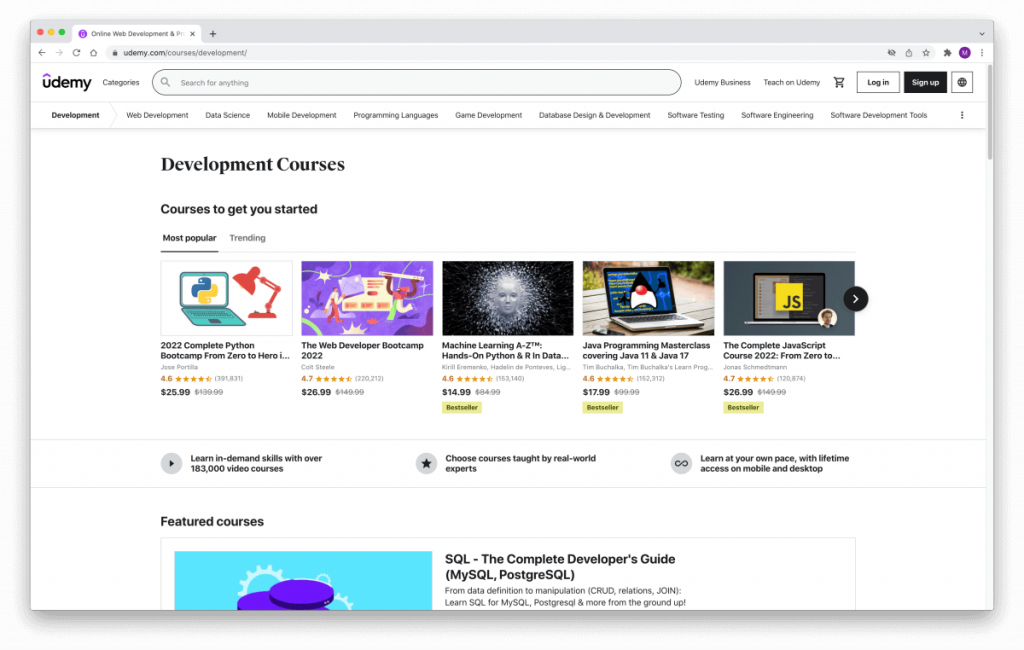
Udemy is better than Codecademy if…
- You only want to learn a narrow skillset – Udemy allows you to purchase individual courses.
- You want to learn at your own pace – Udemy offers lifetime access to any course you purchase.
- You are not in a hurry to start – then you should wait until the next Udemy flash sale to get up to 90% off all courses.
You can learn at your own pace and take your time practising your skills without having to worry about paying a monthly subscription fee.
Hence, if you can’t commit to a regular, weekly learning schedule, Udemy gives you more flexibility than Codecademy.
Recommended courses on Udemy
If you want to learn how to code and don’t have much tech experience, here are a few of my favorite courses on Udemy:
- The Complete Web Developer Course 2.0:
If you want to build beautiful websites and web apps, and become a web developer, this course is perfect for you. After taking it back in 2016–2017, I started making money from small online freelance gigs, quit my job, and became a full-time web dev entrepreneur. - The Complete Web Development Bootcamp:
Another all-in-one, project-based website coding course for absolute beginners. If you are new to tech, and want to learn a handful of popular web programming languages and workflow tools, this course is a fantastic place to start your journey. - The Complete JavaScript Course: From Zero to Expert:
With over 500,000 students and counting, this course is your best bet to learn JS without any coding experience. Jonas, your instructor, does a fantastic job at explaining and showing you how to use JavaScript for hands-on, real-world projects of your own. - JavaScript Web Projects: 20 Projects to Build Your Portfolio:
If you already know some HTML and CSS, the JavaScript Web Projects course is your shortcut to building a portfolio that gets you hired. You get to build 20 practical portfolio projects while you’re learning. That’s a huge stepping stone for applying for your first junior-level positions or freelance gigs online. - Complete Python Bootcamp From Zero to Hero in Python:
If you want to learn the Python programming language and build your own apps and games, this Python course teaches you everything from the basics to more advanced features and topics.

Here are a few helpful links to find the best Udemy courses by topic:
- Top HTML and CSS Courses on Udemy
- Top JavaScript Courses on Udemy
- Top Python Courses on Udemy
- Top PHP Courses on Udemy
- Top Mobile Development Courses on Udemy (iOS)
- Top Mobile Development Courses on Udemy (Android)
Start learning with Udemy here
5: Udacity
Udacity offers hundreds of free and paid online courses for popular tech topics such as web development, data science, machine learning, and more. Their courses consist of interactive video lessons and coding exercises.

Udacity is best known for their signature Nanodegree programs, which are guided, compact curricula designed to get you job-ready as fast as possible.
Each Nanodegree takes you from beginner to career-ready within 3–6 months, assuming you can study about 5–10 hours every week. Each program typically includes 4 to 10 courses and projects that are graded by actual humans – a huge advantage over generic quizzes, for example.
Udacity vs. Codecademy:
Compared to Codecademy, Udacity is:
- More affordable, with hundreds of free in-depth courses
- More engaging (thanks to high-quality video lessons)
- More supportive, with easier access to the helpful community
- More hands-on, with realistic portfolio-ready projects

Udacity is better than Codecademy if…
- You can find a free course for the topic you wish to learn
- You prefer to learn by following video lessons and tutorials
All in all, Udacity is a fantastic place to get started when you are new to coding and tech. Compared to Codecademy, Udacity’s free courses are much more comprehensive and in-depth.
Recommended courses on Udacity
- What is Programming?
Learn what computer programming is about to prep yourself for further learning and a career in programming. A quick, free course for absolute beginners, highly recommended! - Intro to JavaScript:
JavaScript is the most popular programming language for web development. If you want to build beautiful web experiences and become a web developer, this free course teaches you the fundamentals of JS. - Introduction to Python Programming:
If you want to become a Python developer, this free course teaches you how the Python programming language works and how to write clean code, even if you are fairly new to tech. - Artificial Intelligence Fundamentals:
This AI course for beginners teaches you in-demand AI skills that companies are looking for right now. You’ll learn first-hand how to train and deliver machine learning models to boost your chances of launching a successful career in tech. - UX Design for Mobile Developers:
If you want to create your own mobile apps and make money programming, this UX course teaches you how to design apps your users will love.
Start learning with Udacity here

6: edX
edX offers university-level courses in a massive range of topics, not just tech. Some of the most popular topics include law, engineering, biology, science, business, computer science, and artificial intelligence (AI).
edX is a non-profit online course platform created by Harvard and MIT. Hence, your instructors are industry experts from some of the leading universities worldwide.
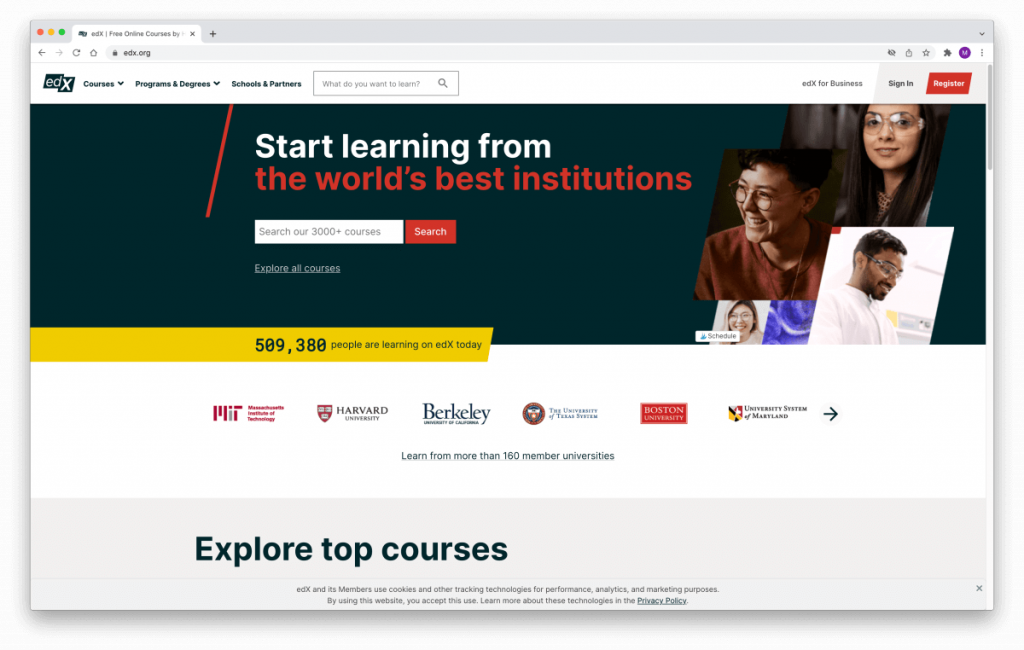
The most unique feature of edX is that it’s completely free to take any course through an audit option. So yes, you get free access to real university courses which can help you grow your career.
However, when you audit a course, you don’t get a certificate or the chance to complete graded assignments. If you want a certificate for a course, it will cost you between $50–300 depending on the course.
edX vs. Codecademy:
Compared to Codecademy, edX is:
- More affordable – you can take most courses for free when you enroll in the audit track
- More in-depth – edX offers real university-level course which cover both the theory and the practice
- More widely recognized – earning a course certificate proves that you have completed an online course through a prestigious university

edX is better than Codecademy if…
- You are interested in higher-level courses from real-world institutions and universities
- You want to get a bachelor’s or master’s degree online or start earning credits for one
Since you can take almost any course for free through the audit track, edX can be a great place to try out different skills when you are new to tech.
Recommended courses on edX
- CS50’s Introduction to Computer Science:
This computer science course is almost a classic for anyone interested in learning how to code from scratch. You will learn how computers work under the hood, so that you can solve coding problems and write programs efficiently. Highly recommended! - Python Basics for Data Science:
This beginner-level Python course gives you a good understanding of how to use Python for data science and analysis. By the end of the course, you will know how to plan and write your own scripts from scratch and solve real-life problems with Python.

Summing it up: The best websites similar to Codecademy for learning to code
There ya go! There are dozens of great sites like Codecademy where you can learn any tech topic you are interested in.
But the most difficult part is knowing which learning platform suits you best. If you need a hand picking the right place to start, please drop me a line in the comments!
Here are a few helpful tips to find the best Codecademy alternative to achieve your goals faster:
- Know your goal:
What do you want to create and build with code? Websites, mobile apps, data science, or something else? Be as specific as possible. - List the skills you need to learn:
Each specialization and goal requires a different skillset. Again, be super specific about what you want to do in the future. Only learn skills you will need – anything else will be a waste of your time. - Use free trials and free resources first:
Paid courses usually deliver better quality and investing money in learning lights a fire under your butt. But before you purchase a course or a subscription, use these 120+ free coding courses to make sure you actually enjoy learning this stuff. - Make a consistent study plan:
How many hours can you dedicate to learning every week? Learning to code isn’t easy, and you need a ton of patience and persistence. Consistency is key. Be realistic and don’t burn yourself out! - Create small projects from day 1:
Yes, start writing your own code as soon as you start learning. You will never learn to code simply by watching someone else do it in a YouTube video. Take as many breaks from your lessons to work on small (very small!) projects of your own. - Track your progress:
To stay motivated, remember to look back at how far you’ve come. It takes time to become job-ready, but you will get there, trust me. It may not always feel like it, but you’re making great progress every day!
So, are you ready to get started?
Here are your quick shortcuts to the online course sites like Codecademy we just covered:
- Learn with Pluralsight
- Learn with Coursera Plus
- Learn with DataCamp
- Learn with Udemy
- Learn with Udacity
- Learn with edX
Now I want to hear from you! Let me know which platform feels like the best fit for you in the comments below. Or is your favorite site missing perhaps? Let me know and I’ll add it to the list!

